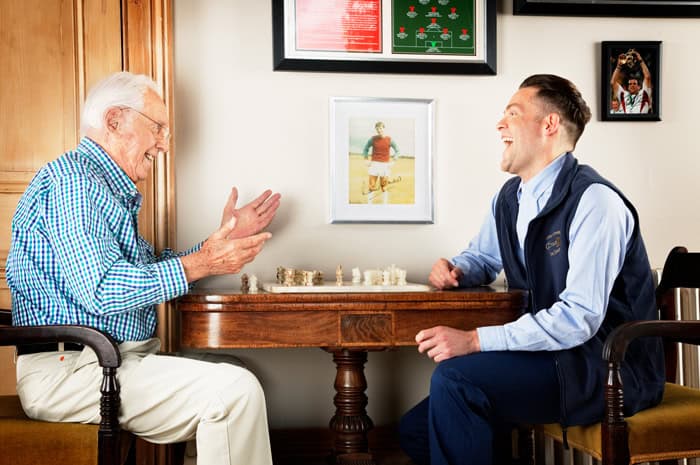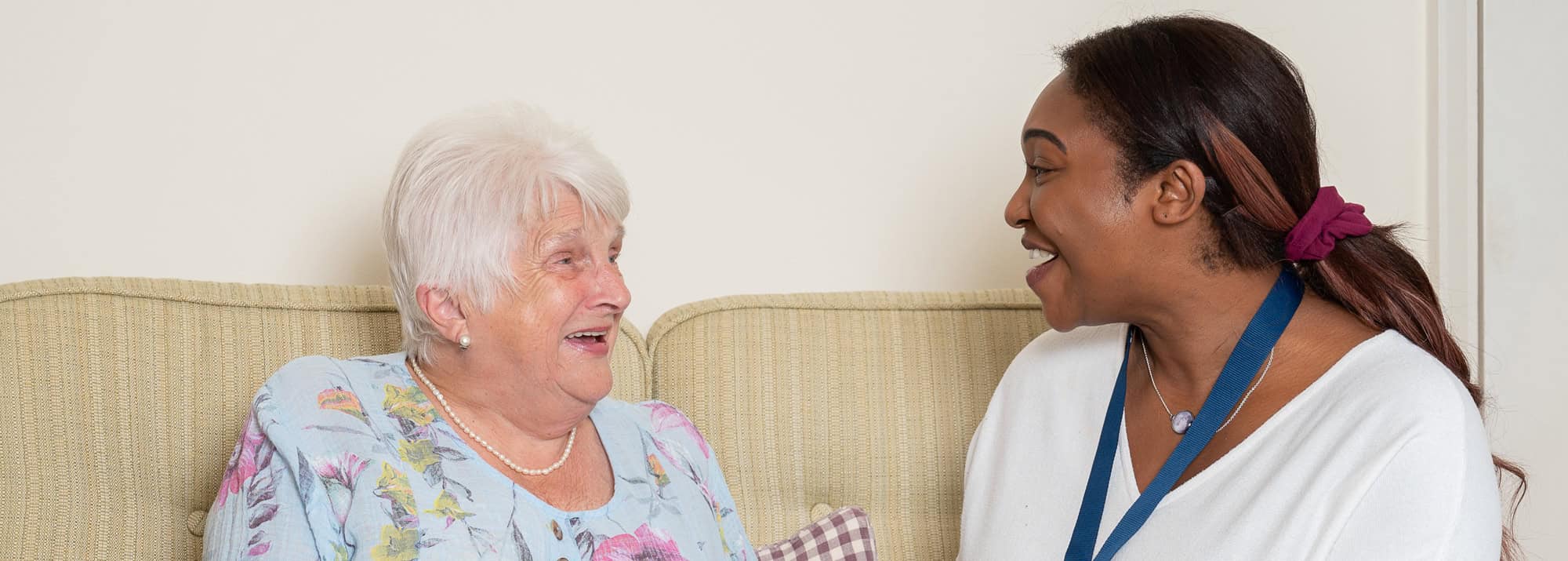You can find out more about the cost of care and funding care services here. Homecare costs are more affordable than you might think and you can arrange your own care plan suited to your needs and preferences.
Home Care: The Benefits for Older People
Ask any older person in the country to list their fears and worries about getting older and the issue which will be at the top of everyone’s list is the loss of freedom and independence. The thought of having to go into residential care worries most people precisely because they can imagine the regimented daily routines and the inability to come and go as they please.
Understandably many older people are looking for an alternative, one where they can keep their freedom and independence whilst still having all their daily needs taken care of. That alternative, and with around 30% of all adults in the UK being over 65, one which is becoming ever more popular, is care at home.
What Is Home Care?
Care at home is where you have an experienced carer come to your own home to look after you. You will be matched with a professional carer who is fully trained and experienced in taking care of older people with specific conditions, or who is there just to take care of your everyday needs whether you have a specific condition or not. Your professional carer can attend your home every day, on a part time basis or for longer. It all depends on how much and what type of care you need.

The Benefits of Home Care
One of the biggest advantages of receiving home care comes with being able to stay in your own home surrounded by the familiar things and comforts that you’re used to. You sleep in your own bed as you’ve always done and have the continued privacy of your own bathroom. You can watch television when you like, take a nap in the afternoon or go out shopping whenever you want.
The point is that nobody is going to stop you doing what you want. In other words, you maintain your independence with the freedom to enjoy doing the things you like in the comfort of your own surroundings but knowing that someone is there to take care of you.
Customised Care Which is Personalised to You
When you enjoy the benefits of home care this means you have the undivided and absolute attention of the person providing your care. Their job is to make your life easier by helping with any daily tasks such as cleaning and cooking, shopping, organising days out and even looking after your pets if you can’t. The care-giver is also vigilant in keeping an eye on any long term health conditions and liaising with medical personnel where needed. Should you be at risk of falls the care-giver is there to help ensure these are avoided.
In fact, our Better At Home study revealed that people experience fewer falls when cared for at home by trained care providers. Care services can be customised to ensure your exact needs are met. If you need help to recover from medical procedures, remembering to take medications or personal care then the help you need is available whenever you need it. Find peace of mind for you and your family, knowing you’re getting all the help you need to live a safe and independent life.
Why Home Care Is Better For Health And Well-Being
Care in your own home is a type of care that has previously been thought the preserve of a small percentage of the population, but in recent years better information and awareness has meant more people know that it is a viable option for them. Around 300 thousand people at any one time are in residential care homes in the UK and yet, Live-in Care Hub research found that nearly 100% of people would rather not go into residential care if they become unwell or unable to take care of themselves.
So although residential care homes do offer a good choice for later life care, the chances are most people would rather stay at home if they are able to. It isn’t just about preferences either, as there is clear evidence that homecare is better for your health and wellbeing too. It is a beneficial option for both the person needing care and their families. It provides companionship, is safe, affordable for many, and allows the person to stay in their own home within the community they feel happiest in. Here are some of the key benefits of homecare (or live-in care) when it comes to yours or your loved ones health and wellbeing:
Safety
When you need support at home, but you live on your own, you may be at risk of falls, issues with medicine schedules and at risk to yourself if you suffer from dementia. Homecare services with your own carer dedicated to your needs, provides help to stay safe in the home because there is someone there with you. Carers can also suggest handy home corrections to make your home safer for you, which gives family and loved ones peace of mind.
Home Maintenance
When you struggle to maintain a clean and tidy home your living environment can degrade, contributing to low moods and sometimes hygiene issues. Most home carers assist with light housework and more cleaning help can usually be arranged if needed.
Activity
With a dedicated carer, supported activities will be encouraged daily to maintain a good level of health and independence. Help with grooming and personal care is also provided. Specialist help like physiotherapy can also be arranged. Carers want to help clients be as independent and happy as possible and support them in this aim by both organising activities and attending regular appointments with their client.
A Healthy Diet
Nutrition can be a real issue when you become elderly, particularly if a person struggles to cook for themselves, or to feed themselves. Dedicated private carers can ensure that nutritional needs are met and help with tasks like preparing healthy meals and feeding, helping older people to enjoy a healthy diet and live life to the fullest extent possible.
Avoiding Loneliness
Loneliness is a huge problem amongst the elderly and homecare ensures that the client has companionship every single day if necessary. Home carers will also help clients to maintain relationships with friends, family and neighbours and help encourage attendance to coffee mornings and community events with people of a similar age. Because loneliness is not just an emotional experience it is also bad for your physical health and increases the likelihood of mortality by 26%. That is more of a risk factor than obesity or lack of exercise according to The Campaign To End Loneliness and you can find out more about the impact loneliness can have on health here.
These are just some prime examples of how care at home is better for your health and wellbeing. Of course residential and nursing homes provide support, but it isn’t dedicated, one-to-one support like home care that will help you stay independent for as long as possible. There is also a lot to be said for being able to stay in the place you love the most, avoiding disruption and the stress of change in later life.

Bespoke Elderly Care That Meets Your Needs
The UK population is ageing quickly according to Age UK (see the Age UK Report here) :There are over 11 million people aged over 65 in the UK
The number of people aged 60 and over is likely to reach over 20 million by 2030
By 2040 nearly 1 in 4 people in the UK will be aged over 65
The number of people aged over 85 is likely to more than double within the next three decades
With an increase in the elderly population comes a constant increase in the need for home care services and domiciliary care. Care homes are already struggling to cope with demand and the NHS struggles with bed blocking because older people don’t always have an appropriate place to go to following their recovery from illness. For these reasons, and many more, home care services have risen in popularity as a viable alternative to residential or nursing homes.
Home care services enable a person to stay in their own home, cared for by a professional carer who is able to help them stay safe, secure and helps them live independently. It is also worth noting that the vast majority of people would rather be cared for at home. Live-in Care Hub research revealed that nearly 100% of people do not want to go into institutional care if they become unwell or unable to care for themselves. For the future of care here in the UK, care at home is a really important alternative to care homes which for many people are not the preferred choice, or even available in some instances.
Home Care: Tailored To Your Needs
Most care homes operate in a ‘one size fits all’ routine where staff help all clients get dressed and ready for the day at the same time, and they are all dressed for bed at the same time, eat at the same time, and are moved into the same areas at the same time. Of course, staff do their best to provide the best possible care, but it is well publicised that carers in care homes struggle to spend much quality time with their clients because of the limits placed on the time they have available.
With home care or live-in care, the level of care is completely tailored to the needs of the client because the care is 1-to-1. Carers working in homecare are able to completely excel in their duties, offering the kind of care they were trained to provide.
Basic Services
Basic care and support duties of a carer providing homecare usually include:
- Helping clients with personal tasks like getting washed and dressed
- Cooking for clients and meeting nutritional needs
- Helping clients get to appointments and social events
- Helping with medicine administration and organisation
- Everyday tasks such as light cleaning around the house
Additional Services
Carers may also provide additional care and support unique to the client’s needs including, but not limited to:
- Specialist care for specific medical needs
- Physiotherapy
- Nursing care
- Accompaniment on trips and holidays
- Pet care
- Gardening
Of course, individual packages are individually priced and the amount of work completed by a carer is reflected in the cost.
However, it is important to know that you can have a homecare package completely tailored to your needs and one that is comparable in price, and often less expensive, than a residential care home. A package that is completely focused on your loved one having the best possible quality of life whether it is basic or more complex in its arrangements with specialist care, including dementia care.

Funding Care
Home care is tailored to your needs and your preferences

Expert Author – Tiggy Bradshaw
Tiggy has more than 20 years’ experience in the care sector and is the award winning CEO of Access Care, a company that specialises in providing peace of mind to families across the UK by recruiting and introducing the finest carers to live-in people’s own homes. Tiggy has many different roles all of which are performed with acute attention to detail and with customer service as the highest priority.
